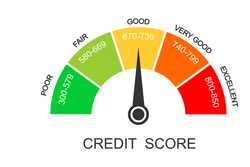What Credit Score Do You Need to Rent an Apartment?

Our evaluations and opinions are not influenced by our advertising relationships, but we may earn a commission from our partners’ links. This content is created by TIME Stamped, under TIME’s direction and produced in accordance with TIME’s editorial guidelines and overseen by TIME’s editorial staff. Learn more about it.
Navigating the rental market can feel like you’re lost in a maze of forms, viewings, and financial scrutiny. Landlords will likely examine your credit history and consider your credit score, which is a measure of that history. But is there a minimum credit score you need to secure an apartment?
Keep reading to learn more about the credit score prerequisites for renting an apartment and actionable tips on optimizing your credit to secure that ideal living space.
There is no standard credit score needed for renting an apartment. Landlords consider your score, but they also look beyond it to examine your full credit report for a detailed understanding of your financial behavior. Most landlords' primary focus is your payment history, which includes consistently paying credit cards and loans by the monthly due date. Red flags such as late payments, defaults, or bankruptcies could make you a risky tenant in the eyes of a landlord.
They also examine other economic indicators, such as the types of credit you hold and your credit utilization ratio. A well-rounded mix of types and a low ratio can indicate financial responsibility. These nuanced details help landlords assess your suitability with more information than they get from a credit score alone.
Even with less-than-stellar credit, landing your desired apartment may still be possible. You can follow several strategies to convince a landlord you’re a great tenant. Here are five tips to increase your chances of getting approved despite having bad credit.
A low credit score can be challenging, but it doesn’t mean you can’t succeed in the rental market. Taking proactive steps can show landlords that you’re responsible and reliable, improving your chances of securing your desired apartment.
If you find yourself on the lower end of the credit score spectrum, don't despair. You have the power to improve your credit, especially if you start well before you need to apply for a rental. With strategic planning you can make a significant impact in a relatively short period.
To track your credit score, consider a service such as Experian or myFICO. Each gives you a breakdown of your credit details so you know you’re on the right track.
First, make it a priority to pay off any existing credit card balances and commit to never missing a payment due date. Chipping away at your debt improves your credit utilization ratio and positively impacts your payment history. Your credit balances and payment history make up 65% of your credit score, so focusing here is critical.
If it’s an option, consider asking a family member to add you as an authorized user on their credit card, especially if they have a strong credit history. This can boost your credit score, as their positive payment history will reflect on your credit report. It’s a simple yet effective way to lift your score quickly. However, remember that if they miss payments on the card, it can drag your score even lower, even if you didn’t rack up the charges.
Improving your credit score is a marathon, not a sprint. By focusing on these key areas, you can optimize your credit, giving yourself a better shot at passing a landlord's scrutiny when it's time to rent your next apartment.
Some landlords may be willing to rent out an apartment without running a credit check. Consider these strategies to work around your credit score.
While most large property management companies follow strict guidelines, including a credit check, smaller landlords managing their own apartments may be more flexible in approving new tenants.
Saving up to prepay a portion of your lease period, perhaps three months or longer, shows you have a lower risk of nonpayment. While uncommon, it's, of course, even better if you can prepay the entire initial lease.
Someone who owns a home and has a vacant room may let you move in without a credit review. If you find someone already renting an apartment and looking to add a roommate, their prior approval from the landlord could be enough to add you to the lease.
If a friend or family member knows a landlord and can vouch for you, you may easily get an apartment without a credit check. Be sure to pay your rent on time and be a respectful tenant, so you don’t discredit your sponsor.
If you have a job with a high income relative to your monthly rent, you may be able to use other financial metrics to show your financial stability. Coupled with a large deposit, a high income may offset your bad credit score.
While getting an apartment with a credit score of “good” or “excellent” is easier, many people find apartments despite having subpar scores. It’s always a good idea to work on improving your credit, but in the meantime the tips above can help you find an apartment without a credit check or offset your credit score with other positive information.
There’s no official lowest credit score to rent an apartment. Every landlord and property manager has different criteria to approve a new tenant. Landlords generally prefer a minimum credit score of at least “good,” which is 670 to 739. A score at or above that range will make apartment applications easier. Still, even a “fair” (580 to 669) or “poor” (300 to 579) score won’t necessarily put the kibosh on your rental hopes.
Yes, you can. However, your options will be limited, and you may have to put down a higher security deposit or bring on a cosigner.
A credit score of 600 isn’t ideal, but it’s far from disastrous for renting an apartment. While you may not qualify for apartments with strict credit requirements, many landlords will consider scores in this range, especially if you can show a stable income and good rental history.
As stated above, many landlords look for a credit score of at least “good” (670 to 739) when approving new rental applications. Still, even with a score rated “excellent” (800 to 850), credit alone isn’t enough to qualify. Presenting a strong rental application improves your chances of landing a great apartment in a desirable area.
The information presented here is created by TIME Stamped and overseen by TIME editorial staff. To learn more, see our About Us page.




